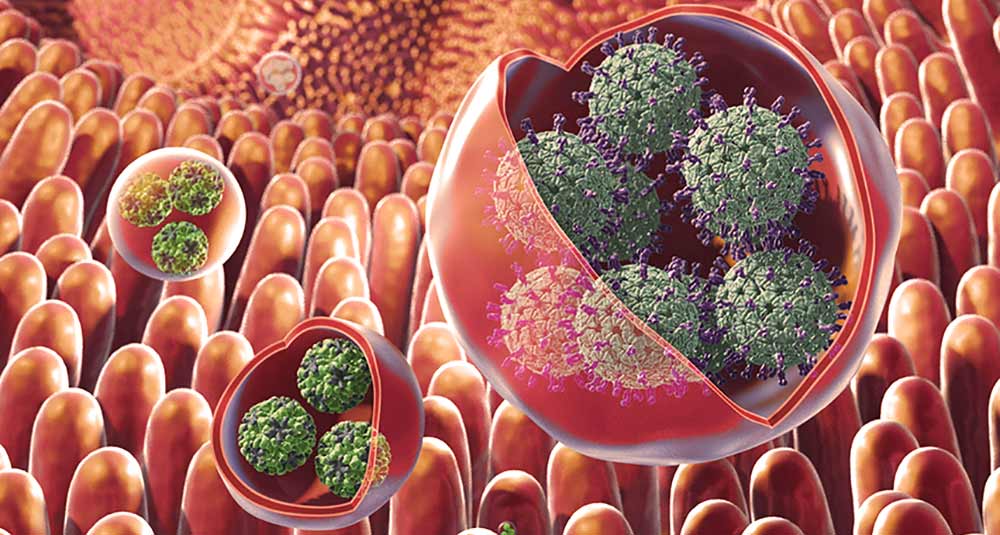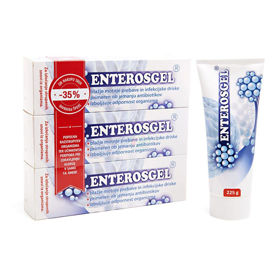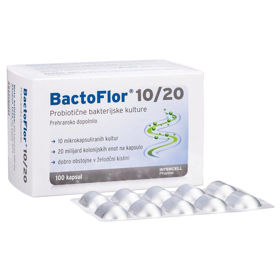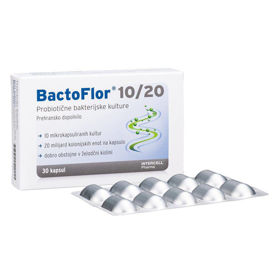A stomach virus (gastroenteritis) includes symptoms such as diarrhea, stomach cramps, nausea or vomiting, and sometimes fever. Unfortunately, there is no effective treatment for stomach virus, so prevention is crucial.
STOMACH VIRUS: General about stomach virus | Symptoms | Stomach virus treatment | Preventiva | Medical assistance | Questions and Answers | Sources/references
A viral infection usually causes stomach flu. It affects people of all ages but is especially common in young children. Most cases in children are caused by a virus called rotavirus. In adults, it is usually caused by Norovirus or bacterial food poisoning.
Image: The image shows a virus in the digestive tract that can cause many health problems.

Noroviruses, the most common cause of illness, are transmitted through food worldwide. Norovirus is especially likely to spread among people indoors. You can also get the virus by touching an infected surface and then touching your mouth.
Rotavirus is the most common cause of viral gastroenteritis in children worldwide, which is usually contracted by putting fingers or other objects infected with the virus into the mouth. It can also be spread through contaminated food. Infection is often worst in infants and young children.
Adults infected with rotavirus may not have specific symptoms, but they can still spread the disease, so they are carriers. This is of particular concern in institutional settings such as nursing homes, as adults with the virus can unknowingly pass the virus on to other people.
Video content: what to do when you get infected with Norovirus?

Stomach flu usually goes away on its own within a week. However, visit your GP, as gastroenteritis can spread quickly to others. People with the most significant risk of infection and more difficult-to-manage symptoms are mainly young children, older adults, and people with weakened immune systems.
Symptoms
The main symptom of the stomach virus is diarrhea. When the gastrointestinal tract becomes infected, many virus activities cause diarrhea. The malabsorption that usually follows occurs due to the destruction of intestinal cells called enterocytes. The virus can also interfere with water reabsorption and cause secretory diarrhea, responsible for loose stools.
Other symptoms include:
- abdominal pains
- nausea and vomiting
- chills or sweating
- elevated temperature
- joint stiffness or muscle pain
- poor appetite
- weight loss
In general, most people recover quickly from stomach flu.
Video content: a quick bit about stomach virus.

However, symptoms may be more severe in infants, young children, older adults, or people of any age with weakened immune systems. In addition, vomiting and diarrhea can cause dehydration quickly, depending on the circumstances.
Signs of dehydration include:
- extreme thirst
- dizziness when standing up
- Less urine output than usual
- urine that is darker in color
- sunken cheeks or eyes
- general weakness
Image: The image shows nausea and abdominal cramps, two common stomach virus symptoms.

The stomach virus is easily spread to other people. It is transmitted from person to person through contact with tiny, invisible particles from the stool or vomit of a sick person. Since different viruses can cause stomach viruses, you can also get gastroenteritis several times.
Abdominal virus treatment and methods of Self-help
Treatment aims to provide the body with enough water and fluids. Fluids and electrolytes lost through diarrhea or vomiting must be replaced by drinking additional fluids. Therefore, drinking as much liquid as possible between meals is still recommended even if you can already eat.
Older children and adults can drink sports drinks for rehydration, but they should not be used for younger children. Instead, use over-the-counter electrolyte and fluid replacement solutions. Do not use fruit juice or carbonated drinks for hydration, as these liquids do not replace lost minerals and can worsen diarrhea.
Drink small amounts of liquid, preferably several times in smaller amounts, preferably every 30 to 60 minutes. Use a teaspoon or syringe for an infant or young child, making administering fluids easier. Babies can continue to drink breast milk or formula along with additional fluids.
Herbal preparations and herbal medicines can also alleviate stomach virus symptoms. Ginger preparations are certainly one of these, often used during pregnancy to combat morning sickness. You can try ginger tablets, tea, or other forms. You can enjoy it in fresh or dried form.
Image: The image shows the preparation of herbs for consumption.

Another common choice is peppermint, as eating peppermint candies or inhaling the essential oil can help reduce nausea. However, it is essential to know that relieving stomach virus symptoms with herbal remedies is unsafe, as the essential treatment is providing fluids.
Nulling saltine crackers, along with a ginger drink, can also help. However, avoid dairy products such as cow's milk, as milk often worsens diarrhea due to temporary lactose intolerance associated with gastroenteritis.
Practically everyone gets a stomach bug from time to time. It's unpleasant but usually goes away in less than a week. Above all, we advise time, rest, and recovery before returning to daily activities. You can also act preventively and take steps to avoid virus transmission or reduce the likelihood of re-infection in the future.
Stomach virus is often confused with severe problems resulting from a bacterial attack. Your doctor will usually prescribe antibiotic treatment if you have a bacterial infection. Still, in many cases, instead of antibiotics, they may also prescribe medications to manage symptoms, including anti-nausea medications. Some people may find relief by taking certain over-the-counter medications. In severe cases, the person may need medical attention.
Picture: The picture shows drinking tea to maintain hydration.

Hydration is crucial during viral stomach complications.
Take care of prevention
Wash your hands
When you are sick, the virus spreads from anything that is infected with the virus. Therefore, thorough hand washing is essential to stop the spread of the virus. Viruses left on the hands can quickly spread to new uninfected surfaces, food, and people you touch.
It is essential to wash your hands thoroughly, especially when you go to the toilet, change a baby's diaper, touch bathroom surfaces, and before eating.
Be careful when eating food.
Clean kitchen surfaces regularly with a disinfectant, especially raw meat or eggs. Keep raw meat, eggs, and poultry away from raw foods. Likewise, avoid eating raw or undercooked meat, eggs, and shellfish.
Always wash fruits and vegetables before eating. When traveling, drink only bottled water and avoid ice cubes, especially in developing countries, as unknown microbes living in the water can make you very sick. Do not prepare food for others when sick and for two days after the symptoms have disappeared.
Maintain hygiene at home.
Clean everything you may have touched when you got the stomach bug. For example, wash the laundry in hot water and dry it at a high temperature. Be sure to use a disinfectant to clean areas where a sick person has vomited or had diarrhea.
Video content: proper hand washing.

When to call/find a doctor?
If you find that your symptoms are getting worse or if they last longer, this may be a sign that you need medical attention. Knowing which stomach symptoms warrant a visit to the emergency room or urgent care is essential. In addition, keeping a close eye on your or your child's symptoms can help manage this disease and prevent complications.
Seek medical attention if:
- You have kidney, liver, or heart disease and need to limit your fluid intake
- vomiting in an adult or child two years of age or older lasting more than one day, or fever or severe diarrhea (large amounts of loose stools every 1 to 2 hours) lasting more than two days
- a child under two years old is vomiting or has diarrhea for more than 12 hours or has a fever associated with vomiting and diarrhea
- vomiting or diarrhea becomes bloody
- you develop sudden, severe abdominal pain
- you are showing symptoms of dehydration
- symptoms do not go away after a week
Customer Questions
What causes stomach flu, and how can I avoid it?
The most common way to develop viral gastroenteritis - often called stomach virus - is through contact with an infected person or consuming infected food or water. Noroviruses, the most common cause of illness, are often passed between people indoors. However, you can also get the virus by touching an infected surface and then touching your mouth.
Proper hand hygiene is critical to stopping the spread of the virus. Everyone in your family should wash their hands with soap and water before eating and using the toilet. If you have a baby, appropriately handle and dispose of soiled diapers[1].
How is the stomach virus treated? Can we heal naturally without the use of drugs?
Viral gastroenteritis infections usually get better on their own without treatment. However, stomach flu can be treated by replacing lost fluids and electrolytes to prevent dehydration. In some cases, over-the-counter medications can help relieve symptoms.
Image: The image shows prescription and over-the-counter symptom relief medications.

For an infant or small child, use a teaspoon or a syringe, as it is easier to administer fluids this way. Babies can continue to drink breast milk or formula along with additional fluids.
Natural "remedies" also include:
- teas such as ginger, anise, and chamomile tea
- inhalation of peppermint essential oil
- licking ginger or menthol candies
- munching saltine crackers[2].
How long does a stomach virus infection last?
Symptoms usually last only a day or two, but occasionally they can last up to 14 days. Because the symptoms are similar, viral diarrhea can easily be confused with diarrhea caused by bacteria such as Clostridioides difficile, salmonella, and Escherichia coli or parasites such as giardia[3].
What are the most common symptoms of a stomach virus?
Common symptoms include:
- abdominal pains
- nausea and vomiting
- chills or sweating
- elevated temperature
- joint stiffness or muscle pain
- poor appetite
- weight loss[4].
Sources and references
Source: Family Health Guide. Conventional and alternative treatment, Dr. Jaro Lajovic, Publishing House Mladinska knjiga
1. Viral gastroenteritis (stomach flu) - https://www.mayoclinic.org
2. Stomach Flu (Gastroenteritis) - https://my.clevelandclinic.org
3. Viral gastroenteritis (stomach flu) - https://www.mountsinai.org 4. Gastroenteritis - https://www.nhsinform.scot













